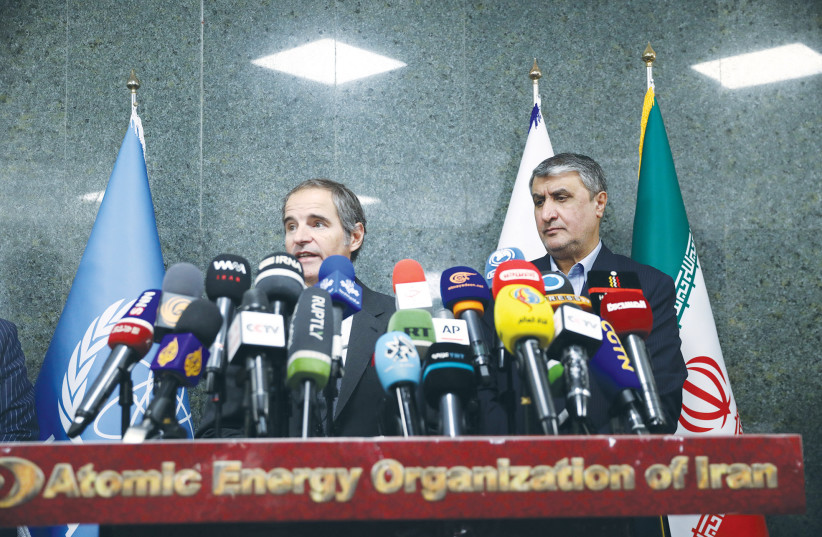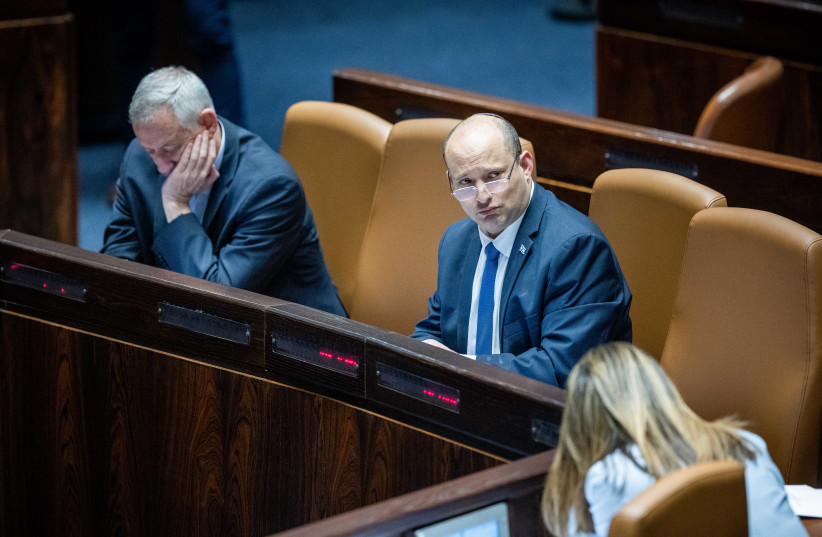This week’s International Atomic Energy Agency (IAEA) Board of Governors meeting in Vienna has been a dramatic one.
For the first time in two years, a resolution rebuking Iran for its nuclear subterfuge is on the table, proposed by the E3 – France, Germany and the UK – and the US. An unprecedented 70 countries signed up to speak ahead of the vote, indicating broad international concern and a likely censure of Tehran.
This comes on the heels of an IAEA report in which Director-General Rafael Grossi wrote, “Iran has not provided explanations that are technically credible in relation to the Agency’s findings” of evidence of nuclear activity at undeclared sites.
It also comes months after world powers and Iran seemed to come incredibly close to reviving the 2015 nuclear agreement – which includes IAEA monitoring arrangements – before the Islamic Republic brought up a new demand: that the Iranian Revolutionary Guard Corps (IRGC) be removed from the US list of foreign terrorist entities.
The US said no, and negotiations have not resumed, though its statement with the E3 at the IAEA Board of Governors urged Iran to return to the table.

As of Wednesday, Iran made clear it is done playing the game of letting the IAEA monitor its declared nuclear sites while lying about undeclared sites, and simply shut off two of the nuclear agency’s cameras.
There may be more to come, such as further advances in the Islamic Republic’s nuclear program, since Iranian Nour News Agency said that Iran’s Atomic Energy Organization “put measures on the agenda” – measures, plural – “in response to the IAEA’s illegal behavior and political reports.”
Drama in Vienna
While this drama plays out in Vienna, Israel is hopeful that it will start a process that will end with the Iranian nuclear file being brought before the UN Security Council.
Behind the closed doors of the Knesset Foreign Affairs and Defense Committee on Tuesday, Prime Minister Naftali Bennett detailed “applicable goals to change the nuclear deal between world powers and Iran, which can turn the deal into one that is good enough.”
That comment confirms The Jerusalem Post’s reporting last week that Israel suggested that the US try to negotiate a new version of the Joint Comprehensive Plan of Action that would remove the “sunset clauses,” gradually lifting restrictions on Iran’s nuclear program. Rather, economic sanctions would be lifted – the carrot – in exchange for maintaining those restrictions, and world powers would threaten massive sanctions if they are violated – the stick.
At the same time, Israel is not overly optimistic that these diplomatic channels will bring substantial changes reducing the threat to its national security anytime soon, and that much is clear from Bennett’s public comments on Iran.
The prime minister told the Foreign Affairs and Defense Committee, “We expect that the IAEA Board of Governors will send a clear warning signal to the regime in Iran and clarify to it that if it continues with its policy of defiance in the nuclear sphere, they will pay a painful price for it.”
However, he also told lawmakers that he told Grossi that Israel is “acting, and will continue to reserve the freedom to take such action against the Iranian nuclear program as may be necessary, at any time, with or without an agreement.”
Bennett returned to his well-worn metaphor of Iran being the head of an octopus with its tentacles – proxies – reaching across the Middle East. Israel will attack the head and not just the arms, he said.
“The days of immunity, in which Iran attacks Israel and spreads terrorism via its regional proxies but remains unscathed, are over,” he said.

Bennett's Israel working to stifle Iran
While Bennett has said more or less the same thing many times over this past year, and even before that as defense minister, his words were even more powerful now.
In the past month, the Mossad said it “foiled” an IRGC plot to assassinate a US general, a French journalist and an Israeli diplomat in Turkey, after Iran International TV – a London-based outlet that opposes the regime – reported that the Mossad had kidnapped IRGC official Mansour Rasouli.
Since then, three Iranian officials mysteriously died: senior IRGC member Hassan Sayad Khodaei was killed in his car in central Tehran by two assassins on a motorcycle, an action US sources attributed to Israel. IRGC Col. Ali Esmaelzadeh fell off of a balcony in his home, reportedly after IRGC intelligence suspected he was involved in security leaks. And Iranian aerospace scientist Ayoob Entezari died of poisoning.
An explosion at Iran’s Parchin military complex near Tehran killed an engineer and injured another employee this week.
Plus, Israel has developed capabilities for its F-35 fighter jets to fly to Iran without needing refueling, and to carry a new one-ton bomb that is protected against jamming and electronic warfare systems.
Ahead of this week’s IAEA vote, Iran has made it very clear that it is unrepentant and has no plans to change its ways. International backup is important, and Israel is taking part in that conversation, with Bennett meeting with Grossi and National Security Adviser Eyal Hulata in constant talks with American counterpart Jake Sullivan. But while the world is still exhausting its diplomatic options, Israel has shown that it will continue to defend itself against the Iranian nuclear threat regardless of the outcome.
